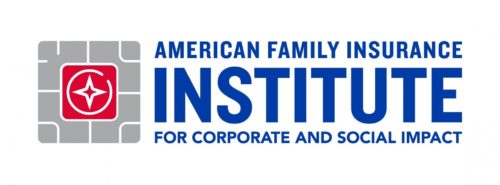When it comes to Black business success, Milwaukee consistently skirts the bottom of the list. A 2022 report from LendingTree found that Milwaukee ranked eighth for the lowest percentage of Black-owned businesses in major metro regions. Out of 28,668 total businesses in the city, Black-owned businesses made up roughly 1.8% of that number — lower than the national average.
Nationally, Black-owned businesses made up just 2.4% of all US businesses, with most of the businesses operating as sole proprietorships, a fact that makes raising capital in a competitive lending landscape even more difficult.
“Over the past few years, we’ve worked really diligently to build up our technical partnerships,” Nikki Purvis said of the African American Chamber of Commerce of Wisconsin, which she joined this summer as president and CEO after civic roles including as the City of Milwaukee’s chief equity officer. “We really do see value in our membership for all of the support we provide.”
While African Americans make up the fastest-growing group of entrepreneurs — the number of businesses owned by Black women, for example, grew 50% from 2014 to 2019 — the biggest barrier to Black businesses remains the lack of capital, Purvis said.
“I think the recurring theme is always access to capital and knowing where to go to access it, and being in the right position from a credit perspective to be able to access it,” she added. “And if you’re not, what are your alternatives? If you can’t go through traditional financing, where do you go and what does that look like?”
How the African American Chamber of Commerce of Wisconsin supports Black-owned businesses
The Chamber works alongside Kiva, a microlending nonprofit, to endorse local entrepreneurs and help them secure funding through the site. It also operates a Revolving Loan Fund to provide gap financing from $5,000 up to $35,000 to eligible applicants. Businesses can use the funds to hire employees, purchase equipment, or complete building renovations at 6% interest, Purvis said.
The org is also focused on helping emerging entrepreneurs. Its RISE MKE program provides entrepreneurial training. Modeled after the Cincinnati-based business accelerator Mortar, the 14-week program instructs new business owners on the ins-and-outs of marketing, branding, networking, and resources to successfully launch a business. The group also has its RISE HSED program that helps individuals earn their high school diploma equivalency, as part of a partnership with Literacy Services of Wisconsin.
Both of the groups participate in a pitch night to showcase their businesses in front of potential investors and members of Milwaukee’s small business community. Outside of RISE, the Chamber hosts a series of capacity-building workshops throughout the year under its SPUR program, led in part by local BIPOC business leaders.
In her first six weeks at the organization, Purvis said she has embarked on a “listening tour,” meeting with some of the organization’s 400 members, state and community leaders, and other key stakeholders to identify Black business barriers and outline programs to tackle the state’s persistent racial wealth gap.
“It’s really all the things that businesses need to be sustainable and viable and take them through the business lifecycle,” Purvis said. “We really try to make sure we’re utilizing our entrepreneurs for those workshops, while supporting small businesses and allowing our members to see people who look like them.”
Removing the disconnect
Fresh in her role, the nonprofit’s new president and CEO is eager to put her lifelong passion and connections to work. As a Black woman born and raised in Milwaukee, Purvis has witnessed firsthand how limited business opportunities have negatively impacted the Black community.
Following her meetings on the ground, one of Purvis’ top priorities at the Chamber is to remove the disconnect between entrepreneurs and business resources. A lack of government funding for marketing, for example, means many Black business owners are left in the dark on local small business initiatives or what resources are available to them.
“I think the reality is that Black business owners are often left out of the equation,” she said. “When we have programs or initiatives, that representation doesn’t exist. To see an equitable outcome, you have to have diverse voices during the ideation phase. That’s what leads to seeing more positive outcomes. When you have diverse businesses, especially Black businesses, they offer so much to the local economy. We look out for our people.”
That’s one of the reasons the Chamber is launching its Legacy center, a coworking and innovation space at its headquarters in the Bronzeville neighborhood.
“Whatever capacity anyone can support Black businesses, know that people are out here hustling. They are competent, they are viable, and they are successful. They just need continued support,” Purvis said. “Knowing I can help in some way is just so rewarding. I’ve seen so many businesses flourish. That’s the motivation for me — to help them continue on their journey.”
Subscribe to This Week in Milwaukee Rising:

This article appears as part of This Week in Milwaukee Rising, a weekly newsletter from Technical.ly highlighting the innovators bringing a more just, equitable and dynamic Milwaukee economy. Subscribe here. The series is underwritten by American Family Insurance Institute for Corporate and Social Impact.
Join our growing Slack community
Join 5,000 tech professionals and entrepreneurs in our community Slack today!
Donate to the Journalism Fund
Your support powers our independent journalism. Unlike most business-media outlets, we don’t have a paywall. Instead, we count on your personal and organizational contributions.

Data center leaders sound the alarm on energy concerns — and a better public narrative

PTW 2025 live blog: A sneak peek at next year’s events

The case for storytelling: Want your region’s tech scene to grow? Start with a story, new data says


